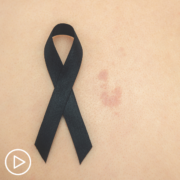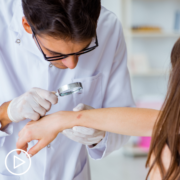Advanced Non-Melanoma Skin Cancer Research Update
Advanced Non-Melanoma Skin Cancer Research Update from Patient Empowerment Network on Vimeo.
Dr. Anna Pavlick highlights ongoing research into preoperative immunotherapy in non-melanoma skin cancer. Dr. Pavlick emphasizes the importance of clinical trials and provides guidance on how to inquire about participating in these studies.
Dr. Anna Pavlick is a medical oncologist and the founding Director of the Cutaneous Oncology Program at Weill Cornell Medicine and NewYork-Presbyterian. Learn more about Dr. Pavlick.
See More from Evolve Non-Melanoma Skin Cancer
Related Resources
Transcript:
Katherine:
What research is showing promise? What are you excited about?
Dr. Pavlick:
Oh, my goodness. Skin cancer research is really skyrocketing.
We have been able to use immunotherapy. Again, we developed this in metastatic melanoma but have really looked at the large-tumor mutational burden that squamous cell and basal cell cancers have as well as Merkel cell and have been able to take immunotherapy from one setting and apply it to the next setting.
And we’ve seen some really spectacular results. Many times, we were just using immunotherapy to treat these malignancies, but the thought process has been well, what happens if we move it sooner and we give it to patients before we take them to the operating room?
So, I think the thing that’s really been exciting has been looking at giving immunotherapy prior to surgery rather than giving it as prevention after surgery.
And the reason we found that very meaningful is that we did a clinical trial giving patients somewhere between two and four cycles of preoperative treatment. And then we took them to the operating room which gave us the opportunity to look at that tumor and see what the immunotherapy did to the cancer. And a very high percentage, more than 50 percent of those patients were found to have no cancer whatsoever left in the specimen that was removed from their body.
And so, now we’ve got studies going on saying since patients have the potential to do so well with immunotherapy before surgery, A, do we even need to do surgery? B, if we do take them to the operating room, do we need to give them more preventive immunotherapy or can we just say you had such a great response, you’re done with treatment?
And so, there is lots of exciting things that we’ll be identifying within the next few years that really, I think, is going to make a huge impact on patient’s lives. If we find out that immunotherapy can eradicate cancers, we may prevent people from having to go to the OR for resection. So, stay tuned for that, very exciting.
Katherine:
How can patients learn more about research? What sorts of questions should they be asking their healthcare team?
Dr. Pavlick:
I think research to me is always an opportunity because this is how we move science forward.
So, I think whenever a patient is given a diagnosis of a cancer, whether it be an early-stage cancer or a later stage cancer, I think their physicians are obligated to really talk to them about clinical trial options for them.
And sometimes, in early-stage cancers, there aren’t any. But sometimes there are prevention studies that may be taking place that once they get the diagnosis, they get treated for their cancer. They may be eligible to participate in prevention studies. So, I think that should always be a question that patients ask is, “Okay, other than the standard of care, are there any research studies that I may want to consider or need to know about?”













